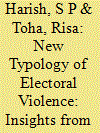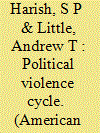| Srl | Item |
| 1 |
ID:
071626


|
|
|
|
|
| Publication |
2006.
|
| Summary/Abstract |
The provinces of Yala, Pattani, and Narathiwat in Southern Thailand have witnessed a sharp spike in violence in the past few years. The unrest is threatening to tarnish Prime Minister Thaksins period in office. The contemporary literature as well as the media tend to portray the strife as one between Buddhists and Muslims. This is markedly different from earlier studies which place less importance on religion and treat the discord as one between Thais and Malays. In this regard, this article aims to explain the transformation from a primarily ethnic strife to a predominantly religious conflict. It argues that despite the rise of the religious factor in the discord, it is flawed to treat the violence in Southern Thailand as entirely between Buddhists and Muslims. It further contends that the ethnic Thai-Malay divide is still deeply entrenched in the insurgency.
|
|
|
|
|
|
|
|
|
|
|
|
|
|
|
|
| 2 |
ID:
169907


|
|
|
|
|
| Summary/Abstract |
Existing literature on election violence has focused on how violence suppresses voter participation or shapes their preferences. Yet, there are other targets of election violence beyond voters who have so far received little attention: candidates and government agencies. By intimidating rival candidates into dropping out of the race, political hopefuls can literally reduce the number of competitors and increase their likelihood of winning. Likewise, aspiring candidates can target government agencies perceived to be responsible for holding elections to push for electorally beneficial decisions. In this paper, we introduce a new typology of electoral violence and utilize new data of election violence that occur around executive elections in Indonesia from 2005 through 2012. The types of violence we identified differ in these ways: a) Of all cases of electoral violence observed in this article, most incidents were targeted towards candidates and government bodies; b) candidates are generally targeted before elections, whereas voter-targeting incidents are spread out evenly before and after elections and government-targeted violence tends to occur afterwards; c) pre-election violence is concentrated in formerly separatist areas, but post-election violence is more common in districts with prior ethnocommunal violence. These distinctions stress the importance of examining when and why different strategies are adopted.
|
|
|
|
|
|
|
|
|
|
|
|
|
|
|
|
| 3 |
ID:
153778


|
|
|
|
|
| Summary/Abstract |
Elections are often violent affairs, casting doubt on the canonical claim that democracy makes societies more peaceful by creating nonviolent means to contest for power. We develop a formal argument to demonstrate that this conclusion is incorrect. Holding elections has a direct effect of increasing levels of violence close to the voting, as this is when electoral violence can influence political outcomes. Precisely for this reason, elections also have an indirect effect of decreasing levels of violence at all other times, as parties can wait for the election when their efforts are more likely to succeed. The direct and indirect effects generate a “political violence cycle” that peaks at the election. However, when the indirect effect is larger, politics would be more violent without elections. When elections also provide an effective nonviolent means to contest for power, they unambiguously make society more peaceful while still generating a political violence cycle.
|
|
|
|
|
|
|
|
|
|
|
|
|
|
|
|